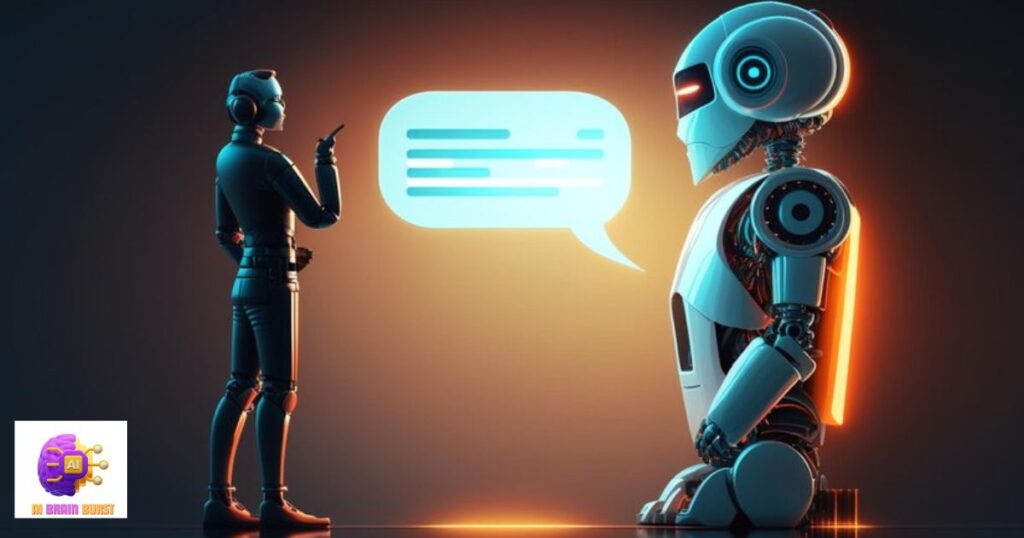Artificial Intelligence (AI) refers to the development of computer systems that can perform tasks requiring human-like intelligence, such as learning, problem-solving, and decision-making. It involves the creation of algorithms and models that enable machines to analyze data, adapt to changing circumstances, and execute complex functions.
Curious about tapping into the power of Artificial Intelligence to get answers? Discover the simplicity of asking AI questions just frame your inquiry, and let the machine intelligence unravel the information you seek. Ready to unlock the potential? Start by exploring the art of questioning AI and witness a world of knowledge at your fingertips.
Where can I go to ask AI questions, is there an AI I can talk to?
Ever wondered where to go when you have burning questions for Artificial Intelligence? Look no further! Various platforms and virtual assistants offer you the opportunity to interact with AI seamlessly. From chatbots on websites to virtual assistants like Siri, Google Assistant, or Alexa, you can engage in conversation and ask AI questions about a wide range of topics. These AI interfaces are designed to understand and respond to your inquiries, making information accessible at your fingertips. So, whether you’re pondering about trivia or seeking expert advice, there’s an AI out there ready to chat with you! If you’ve ever found yourself banned from character AI interactions, fear not – the vast landscape of Artificial Intelligence welcomes you to explore and learn!
The Best types of questions to ask to get the most out of your ai conversations
Getting the most out of your AI conversations involves asking the right types of questions. Start by formulating clear and specific inquiries to elicit precise and relevant responses. Instead of broad queries, break down your questions into smaller, focused parts. Additionally, consider asking open-ended questions that prompt the AI to provide detailed and informative answers. By structuring your queries thoughtfully, you can enhance the quality of your AI interactions and extract valuable insights or assistance.
Furthermore, experiment with questions that encourage the AI to showcase its capabilities. Challenge it with tasks that align with its strengths, whether it’s solving problems, providing recommendations, or generating creative ideas. The more tailored and strategic your questions, the more you’ll uncover the depth of AI’s potential and harness its abilities to meet your specific needs.
1. Be specific: Being specific involves providing clear and detailed information to avoid ambiguity. It enhances communication by offering precise details or instructions, leading to a more accurate understanding and effective outcomes.
2. Use clear, concise language in your ai conversations: Using clear, concise language in AI conversations ensures effective communication and better understanding. It streamlines the interaction, helping the AI comprehend your queries accurately and respond more efficiently.
3. Provide enough information in your ai conversations: Ensure effective communication in AI conversations by providing sufficient information. Furnishing context and details helps the AI better grasp your queries, leading to more accurate and relevant responses.
4. Use appropriate tone and wording when having ai conversations: Maintain a considerate and appropriate tone in AI conversations by choosing words carefully. Using polite and respectful language fosters a positive interaction, enhancing the overall experience with artificial intelligence.
5. Test and refine: Continuous improvement in AI conversations involves testing and refining your interactions. Regularly assess the effectiveness of your queries, experiment with different approaches, and refine your communication style to optimize the dialogue for better outcomes.
What is an example of conversational AI?

| Conversational AI Examples | Description |
| Chatbots | Text-based AI systems designed to simulate |
| human conversation for customer service, | |
| support, or information retrieval. | |
| Voice Assistants | AI-powered voice-enabled systems like Siri, |
| Alexa, Google Assistant, or Cortana that | |
| respond to spoken commands and questions. | |
| Virtual Customer Service Agents | AI-driven virtual agents that assist customers |
| with inquiries, troubleshooting, and support | |
| across various platforms and industries. | |
| Language Processing APIs | Application Programming Interfaces (APIs) |
| that enable developers to integrate natural | |
| language understanding and processing into | |
| their applications and services. |
What are questions that ai can’t answer?
While AI has made remarkable strides, there are certain questions it struggles to answer. Queries requiring emotional understanding, nuanced context, or subjective opinions may challenge AI systems. Additionally, ethical and moral dilemmas often surpass the scope of AI, as they involve complex human values and perspectives that machines find challenging to navigate.
What questions should I ask about AI?
1. Purpose: Ask about the specific purpose or task for which the AI is designed.
2. Capabilities: Inquire about the range of capabilities and functions the AI system possesses.
3. Training Data: Ask about the type and source of data used to train the AI model.
4. Accuracy: Seek information on the accuracy and reliability of the AI’s responses.
5. Limitations: Inquire about any known limitations or scenarios where the AI might struggle.
6. Updates: Ask how frequently the AI system receives updates or improvements.
7. Privacy: Seek clarity on how the AI handles and protects user data and privacy.
8. Integration: Inquire about compatibility and integration options with other systems or platforms.
9. Costs: Ask about any associated costs, licensing fees, or subscription plans.
10. User Support: Learn about available customer support and resources in case of issues or questions.
Why is AI so interesting?

AI captivates our interest due to its transformative impact on various aspects of our lives. Its ability to mimic human-like intelligence and continuously learn from data enables innovations in fields such as healthcare, finance, and technology. The prospect of machines understanding, reasoning, and solving complex problems has sparked curiosity, paving the way for breakthroughs that were once thought to be purely science fiction.
Moreover, AI’s allure lies in its potential to address intricate challenges, automate mundane tasks, and enhance efficiency. As AI systems evolve, the possibilities for advancements in robotics, natural language processing, and decision-making become increasingly exciting. The interdisciplinary nature of AI, bridging computer science, mathematics, and cognitive science, contributes to its fascinating journey, offering a glimpse into a future where intelligent machines play pivotal roles in shaping the way we work, live, and interact.
What is the best AI to talk?

Determining the “best” AI to talk to depends on your specific needs and preferences. Voice-activated virtual assistants like Siri, Google Assistant, and Alexa are widely popular for general queries, setting reminders, and controlling smart devices through natural language interactions. If you’re looking for a more conversational and personalized experience, chatbots on websites or messaging platforms can provide assistance in real-time, often tailored to a particular domain or business.
Moreover, there are AI language models like OpenAI’s GPT-3 that can engage in more sophisticated conversations and answer a diverse range of questions. The best AI for you to talk to ultimately hinges on your goals, whether it’s casual conversation, seeking information, or solving specific problems. As technology advances, new AI interfaces continue to emerge, offering users a variety of options based on their communication preferences and requirements.
How To Ask AI What Things Look Like?
To ask AI what things look like, simply describe the object or scene in clear, concise language. Provide relevant details such as color, shape, size, and any distinguishing features. Then, prompt the AI with a question or command, such as Can you describe the appearance of a red apple? or Show me images of famous landmarks in Paris. AI vision models can analyze the input and generate descriptions or provide visual representations based on the information provided, helping you understand and visualize objects or scenes more effectively.
Can You Ask AI How to Draw?
Certainly! To inquire about drawing assistance from AI, you can ask specific questions like Can AI help me learn how to draw? or Provide me with step-by-step drawing instructions for a cat. There are AI tools and platforms equipped with drawing capabilities that can offer guidance, tutorials, or even generate images based on your descriptions. By seeking AI’s help, you can explore new artistic techniques, receive feedback on your drawings, and enhance your creative skills in a dynamic and interactive way.
Ask Google Ai A Question

Asking Google AI a question is simple just type your query into the search bar. Google’s AI algorithms analyze the input and provide relevant search results, answering questions or offering information on a wide range of topics. Whether you’re looking for quick facts, in-depth explanations, or real-time updates, asking Google AI enables you to access a vast repository of knowledge at your fingertips.
Ask Ai A Question Online Free
You can ask AI a question online for free on various platforms like chatbots, forums, or search engines. Websites like ChatGPT allow you to engage in conversational AI interactions without any cost. Additionally, virtual assistants such as Google Assistant or Siri are accessible on most devices and offer free AI-based responses to your inquiries. Simply type or speak your question, and AI will provide answers or assistance based on its capabilities.
Ask Ai Login
As of my last knowledge update in January 2022, there isn’t a specific concept called Ask AI Login. However, if you are referring to a platform or service where you need to log in to interact with AI, it typically involves creating an account or signing in to access personalized features or historical interactions. Always ensure you use secure login practices to protect your information when engaging with AI platforms. If “Ask AI Login” refers to a specific service introduced after my last update, please check the platform’s website or documentation for the most accurate and recent information.
Ai That Answers Questions Free
| AI Platform | Description |
| ChatGPT | OpenAI’s language model for free-form conversations |
| Google Search | Utilizes AI algorithms to answer search queries |
| Wolfram Alpha | Provides computational answers to factual queries |
| Quora | Community-driven platform with AI-powered Q&A |
| Mycroft | Open-source AI assistant offering free responses |
Ask Ai App
- Instant Responses: An Ask AI app provides quick and immediate answers to your questions, offering efficiency in information retrieval.
- Accessibility: With the app on your device, you have 24/7 access to AI assistance, enabling on-the-go inquiries and solutions.
- Convenience: The app allows you to seek information effortlessly through natural language, making it a user-friendly and convenient tool.
- Personalization: Some Ask AI apps may tailor responses based on your preferences and history, offering a more personalized user experience.
- Learning Opportunities: Apps often provide insights and explanations, fostering continuous learning by offering detailed responses to your queries.
- Multifunctional: Many Ask AI apps are versatile, capable of answering questions across a broad spectrum of topics and functionalities.
- Hands-Free Interaction: Voice-enabled Ask AI apps allow for hands-free interactions, enhancing accessibility and usability in various situations.
Ask Ai Chatbot

An Ask AI chatbot serves as a virtual conversational agent designed to respond to user queries in a chat format. With the ability to engage in natural language interactions, these chatbots facilitate seamless communication, providing instant and helpful answers to a diverse range of questions. Whether for customer support, information retrieval, or interactive discussions, Ask AI chatbots offer an accessible and user-friendly way to obtain assistance in real-time.
Ask Ai Chatgpt
Ask AI ChatGPT is a dynamic platform that utilizes OpenAI’s advanced language model to engage in free-form conversations. Users can pose questions, seek information, or engage in discussions, and ChatGPT responds contextually, generating human-like responses. With its versatile capabilities, Ask AI ChatGPT serves as a user-friendly tool for a wide array of conversational applications, from problem-solving to creative brainstorming.
Ask Ai Chat And Get Answers

With Ask AI chat, you can effortlessly pose questions and receive prompt answers in a conversational format. This interactive approach makes information retrieval more engaging and accessible. Whether you’re seeking quick facts or in-depth explanations, asking AI in a chat format provides a user-friendly and efficient way to obtain the answers you need.
FAQ’s
Can I Ask AI a question?
Yes, you can ask AI a question by typing or speaking your inquiry through various platforms and applications that support AI interactions.
How do I ask a question to Google AI?
To ask a question to Google AI, simply type your inquiry in the Google search bar, and the AI algorithms will generate relevant search results and answers.
What is the best free AI to ask questions?
ChatGPT is a notable example of a free AI that excels in answering questions through natural language conversations.
Is chat with Ask AI free?
Yes, chatting with Ask AI, such as ChatGPT, is often free for basic interactions, though specific platforms or advanced features may have additional costs.
Conclusion
In conclusion, the world of AI has opened up new avenues for communication, problem-solving, and knowledge exploration. With the ability to ask AI questions, we witness a fusion of technology and human interaction that streamlines information access and facilitates learning in diverse domains. As AI continues to evolve, its user-friendly interfaces, like ChatGPT, contribute to a more interconnected and accessible digital landscape, promising a future where the exchange of information is not only efficient but also engaging for users worldwide.
The convenience of asking AI questions spans from simple inquiries to complex problem-solving, offering a valuable resource for users seeking information in real-time. Embracing this technological advancement not only enhances our understanding of the world but also highlights the potential for collaborative learning and creative exploration. As we navigate the evolving landscape of AI interactions, the ability to ask questions becomes a powerful tool, democratizing access to knowledge and fostering a more inclusive and informed global community.








